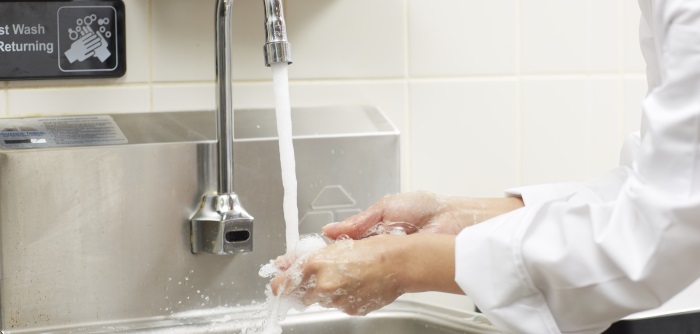National Food Safety Month Week 1: Focus is on personal hygiene

 When you wash your hands, use warm water and antibacterial soap. Then, wash your hands vigorously for at least 20 seconds.
When you wash your hands, use warm water and antibacterial soap. Then, wash your hands vigorously for at least 20 seconds.From the start of the pandemic, health authorities urged the public to cover their mouths and noses when coughing or sneezing and to wash their hands often to reduce the spread of coronavirus.
These personal hygiene steps have always been at the foundation of the ServSafe food-safety training program, and the pandemic reinforces why they are so critical. What you can’t see could really harm you.
As National Food Safety Month kicks off, ServSafe, the National Restaurant Association’s food safety training and certification program, is offering tips, tools and education on proper hygiene practices that restaurant managers and employees should follow.
NFSM’s theme this year — in celebration of ServSafe’s 30th anniversary — is “Managing Risk: 30 years of Food Safety.” Over the coming weeks, the team is offering 30 best practices in five different categories for staff members explore. Topics this year are:
- Week 1: Personal hygiene
- Week 2: Cleaning and sanitation
- Week 3: Safe food preparation
- Week 4: Food safety procedures
- Week 5: COVID-19-specific safety procedures
All the information is sharable through a series of handouts, activity sheets, and other tools available for download.
Good hygiene is a strong first defense
Virtual “Employee of the Week” Holly will lead Week 1’s lessons on personal hygiene. Her top tips include:
- Wash your hands. Use warm water and antibacterial soap. Wash your hands vigorously for at least 20 seconds.
- Wear gloves BOH. By wearing gloves in the back of the house and changing them between tasks, employees can prevent the spread of germs and cross-contamination when working with raw and cooked foods.
- Keep uniforms clean. Aprons, uniforms and hats should be clean/changed as needed to prevent cross-contamination. Dirty clothes can carry pathogens, which can be transferred to your hands and food you’re handling.
- Get rid of excessive accessories. Avoid wearing bracelets, large rings, and long and false nails. Cover hair if required, and pull back long hair. Cover beards with a restraint too, such as a beard net.
- Stay home if you’re sick. If you’re sneezing, coughing or have a fever, do not go into work.
Larry Lynch, the Association’s senior vice president of Certifications & Operations, tells operators they must always reinforce the importance of good personal hygiene, especially hand washing.
“Reinforce good hand hygiene with your staff members,” he said. “Everyone must frequently wash his or her hands. Hand sanitizers are good to have, but they’re never a replacement for a vigorous 20-second hand washing. Don’t put restrictions on the time employees need to do it. Instead emphasize the importance and teach them proper handwashing techniques.”